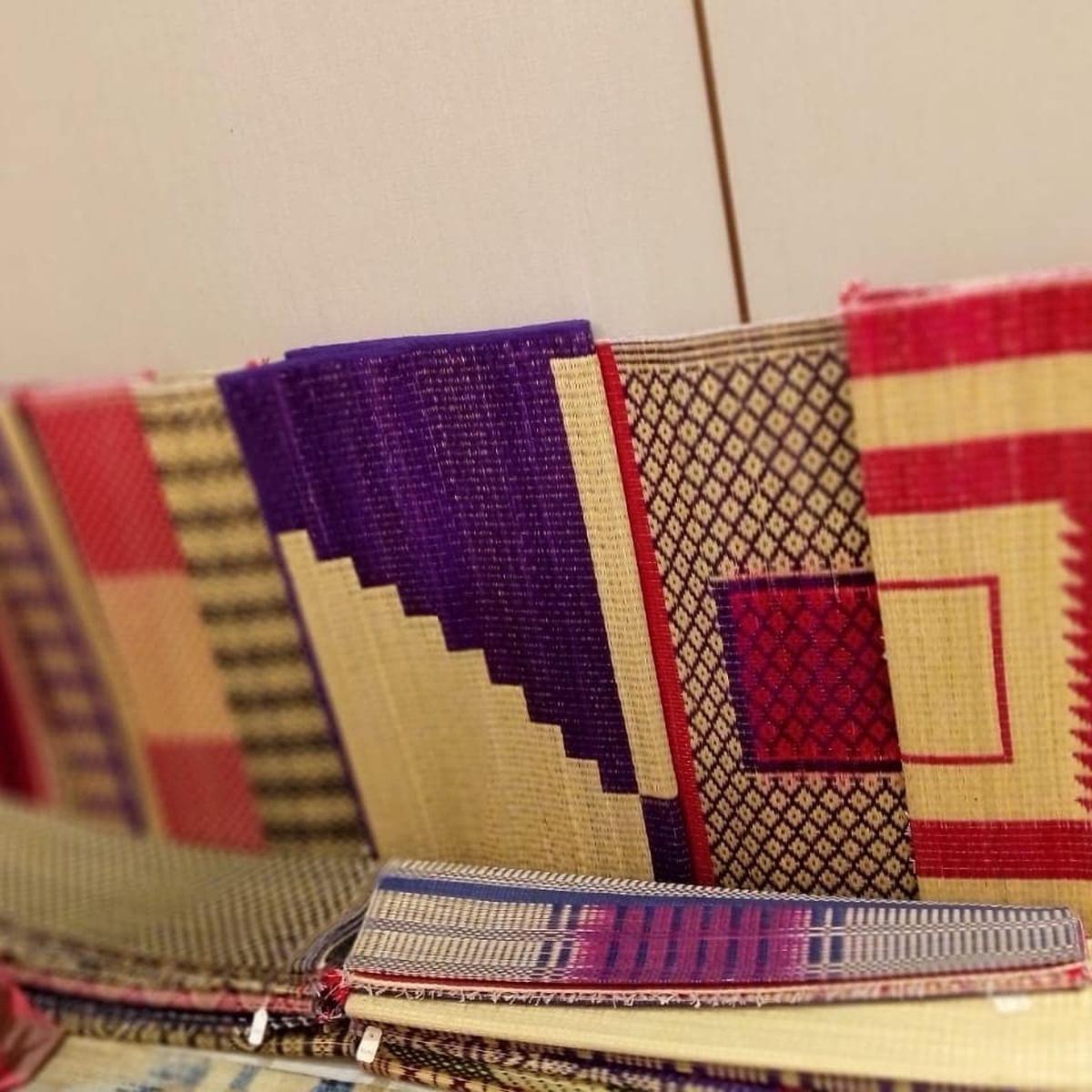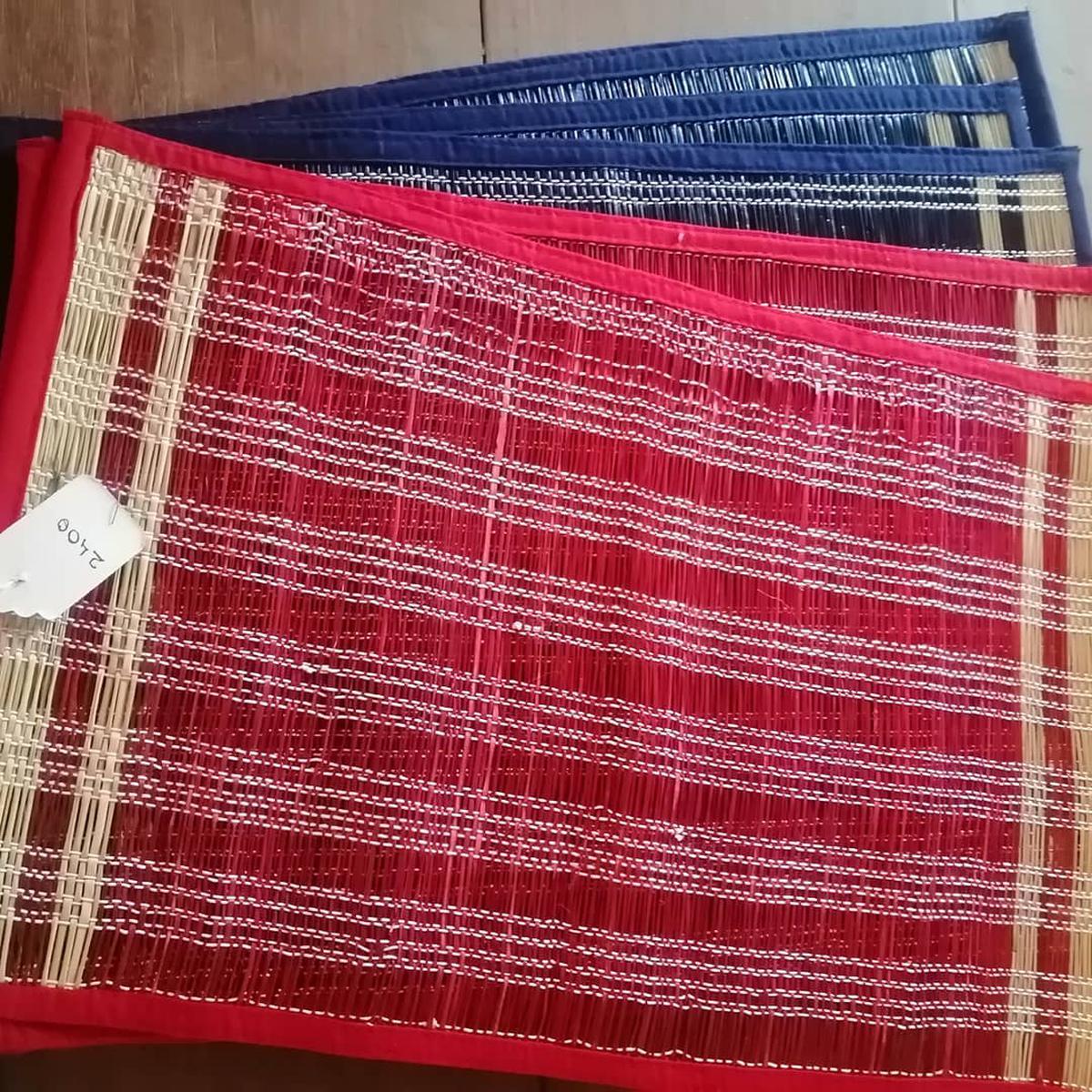When the Killimangalam Pulpaya challenge, aimed at finding customers for traditionally woven grass mats, began trending on social media, it fuelled a movement to save the heritage craft
When the Killimangalam Pulpaya challenge, aimed at finding customers for traditionally woven grass mats, began trending on social media, it fuelled a movement to save the heritage craft
In the first week of June, 2022, the Killimangalam Pulpaya, a traditional straw mat indigenous to Killimangalam in Thrissur district in Kerala, began trending on social media. People from Kerala and beyond began placing orders. A ‘pulpaya challenge’, which urged people to buy at least one straw mat through various social media platforms, has sparked a brisk sale of mats that were lying unsold at the Killimangalam Pulpaya Neythu Cooperative Society, one of the only centres weaving grass mats in Kerala. Two weeks since the challenge was announced, the women making the mats have their hands full. Mats worth ₹4 lakh have already been sold.
A little away from the banks of the Bharathapuzha, where the society has its office, the weavers (four women) led by the secretary of the society Sudhakran N C, are happy that their efforts are now bearing fruit. The society had been selling its mats mainly through exhibitions and a few handicraft collectives, but since the 2018 Kerala flood, sales nosedived. The COVID-19 outbreak worsened the situation, and they had unsold mats worth about ₹5 lakh.
A heritage craft
The straw mat weaving was traditionally practised by the Kurava community, who inhabited the banks of the Bharathapuzha. Over the years, as the younger members of the community drifted towards more lucrative jobs, and plastic mats became an accepted alternative, the weaving tradition was pushed to the brink of extinction. However, the co-operative society, registered in 1953, has been striving to keep the heritage craft alive.
In order to help the weavers regain the market, Vayali, a folklore collective based in Thrissur along with the Alternative Learning School of Moozhikulam Sala, an organic campus that follows a traditional lifestyle based in Chalakkudy, launched the Pulpaya challenge, which will run through June.
“The banks of the Nila (Bharathapuzha) had two such societies engaged in kora grass mat weaving — Vaniyamkulam and Killimangalam. Today, the Killimangalam Society is the only unit that makes these mats, functioning with five active members,” says Vinod Nambiar, executive director of Vayali. The mats won a UNESCO recognition, the ‘Seal of Excellence’ in 2006. In 2016, Vayali produced a documentary film on P Prabhavathi, a weaver, who worked with the society for 41 years, single-handedly leading it when it almost closed down. Prabhavati stopped weaving following a brief illness in 2018.
“The idea is to preserve the essence of folk art and help the artisans get what is due to them. We are exploring the possibilities of applying for a Geographical Indications (GI) tag and are in talks with the Directorate of Handicrafts, Thrissur, to include this craft in the ‘Vanishing Traditions’ category,” says Vinod. “We are also considering inviting designers and other agencies who work in this space to document the unique designs of Killimangalam and the processing method they follow,” he adds.
Though the designs of the mats remain the same, the processes have undergone certain changes, says Sudhakaran. While fresh Kora grass (called muthanga pullu in Malayalam) was collected from the banks of the Bharathapuzha in the earlier days, it is now bought in straw form from Chittoor, Palakkad district, for ₹ 350 a kilo. “A relatively simple mat in standard size (34 inches x 72 inches) can take up to one week. If the design is complex, it could take a weaver up to 15 days,” says Sudhakaran. The weavers are paid ₹ 150 a day.
Done by hand
While the weaving is done on traditional looms, the designs are done by hand. Though the current crop of weavers do not belong to the Kurava community, they still follow the original design patterns set by the Kuravas. “Some designs are time consuming. Even a small flower design can take up to half an hour,” says Sindhu M S, one of the weavers. “Our work begins with processing — soaking the straw, drying it, dyeing it (dye is bought from Alappuzha). Weaving takes place after that. The work needs a lot of patience, but it is extremely satisfying,” she says.
Apart from regular floor mats, the team makes yoga mats, table runners, prayer mats, table mats, wall decor and kalyana paya (wedding mats). The kalyana paya is gifted by some communities to the bride and groom on their wedding day, with their names and the date of the wedding woven into the mat. “We take orders for wedding mats ahead, because weaving names and dates is time consuming,” says Sindhu.” The price of the mats start from Rs 1,800 and goes up to 5,000 or more depending on the size and the design.

Killimangalam straw mats
| Photo Credit: Special Arrangement
“Our effort is to bring these artisans and their craft to the mainstream,” says T R Premkumar, director of Moozhikulam Sala. “The weavers are in the job not just for the money, but also because they take pride in carrying on a heritage craft. We need to make the general public and policy makers aware of their work,” he adds.
Orders for the mat can be placed on 9961608084/ 9947847279
The weavers would bring the mats to ‘Njattuvela Festival’ from June 30 to July 6 at Changampuzha Park, Edappally. A GI (Geographical Indications) tag workshop will be organised at the venue. It will be handled by C R Elsy, former head of the IPR Cell of the Kerala Agricultural University.

























